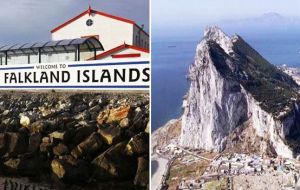MercoPress. South Atlantic News Agency
Leaving the EU would be disastrous for the Falklands, Gibraltar and Ulster
 “If you were born in Yorkshire, like me, being British is effortless”, writes former Foreign Secretary William Hague
“If you were born in Yorkshire, like me, being British is effortless”, writes former Foreign Secretary William Hague  “Whenever Gibraltarians or Falkland Islanders have expressed a collective opinion, they have recorded 99 per cent majorities for the sovereignty of the UK”
“Whenever Gibraltarians or Falkland Islanders have expressed a collective opinion, they have recorded 99 per cent majorities for the sovereignty of the UK”  Small wonder that the Chief Minister of Gibraltar has said that a British exit could have disastrous consequences for the people on the Rock.
Small wonder that the Chief Minister of Gibraltar has said that a British exit could have disastrous consequences for the people on the Rock.  Falklands representative has said that Britain leaving the EU could be “catastrophic” because nearly three-quarters of their exports go to the EU market
Falklands representative has said that Britain leaving the EU could be “catastrophic” because nearly three-quarters of their exports go to the EU market  Whenever an Argentine president launches a new diplomatic drive against the self-determination of the Islanders, they receive no hearing at all in European capitals
Whenever an Argentine president launches a new diplomatic drive against the self-determination of the Islanders, they receive no hearing at all in European capitals By William Hague - Among the most inspiring experiences of my time in politics was meeting people who, in spite of great pressure to the contrary, chose to be British.
If you were born in Yorkshire, like me, being British is effortless. While we still cast suspicious glances at our Lancastrian neighbours, these days that is only for the sake of ribbing them: we do not fear that any outside force will threaten our identity and loyalty.
The opinions of those who choose, work and fight to be British should not be ignored
But if your native land is Gibraltar, the Falkland Islands, or Northern Ireland, your right to remain British requires a vigilance, a resolve, and sometimes the exertion of an effort that has come recently to Scotland and is still unfamiliar to most of us in England and Wales.
Maintaining that right involves you in an active choice, at the very least to vote in referendums to keep your links with the UK, but in Northern Ireland it is to endure decades of terrorism, and in some overseas territories to resist the habitual threats and bullying of your far larger neighbours.
Whenever Gibraltarians or Falkland Islanders have expressed a collective opinion, they have recorded 99 per cent majorities for the sovereignty of the UK. Faced respectively with border closures and foreign invasion, they have come through them with stoic determination. In return, Britain has expended precious blood or huge diplomatic capital in their defence.
This week, the debate has started to rage about whether leaving the EU would endanger British and European security. Riddled with faults as it is, the EU nevertheless provides a structure that restrains the centuries-old rivalries of continental Europe. Everything I saw as Foreign Secretary corroborates what David Cameron and recently retired intelligence chiefs have said in recent days.
As they have explained, security in the 21st century is very much about keeping the citizen in London, Manchester or Birmingham safe from indiscriminate terrorism. But it is also still about supporting those who live close to the edge of British protection – people who deserve to be considered in this referendum debate.
I lost count of the number of times I had to complain to a Spanish Foreign Minister about intrusions into the waters of Gibraltar, or unnecessary delays being caused at a border crossed every day by thousands of people going about their business. On most of these occasions, my trump card was that both Britain and Spain are members of the European Union, even to the point of calling in Commission officials from Brussels to insist that the freedom to cross the border be maintained.
If the UK leaves the EU, Gibraltar leaves with it, and the economic impact on its people, particularly the damage done to its financial services industry, would be very serious. For Spain, the legal constraints on a more hostile approach would be lifted, potentially leading to severe disruption of trade and workers at the border, or even a return to the past policy of a total land blockade. Small wonder that the Chief Minister of Gibraltar has said that a British exit could have disastrous consequences for the people on the Rock.
Seven thousand miles further south, the Falkland Islands Government uses similar language. Their representative has said that Britain leaving the EU could be “catastrophic” for them because nearly three-quarters of their exports go to the EU market, while they are shut out of most of South America by Argentine pressure.
Not only would the Falklands’ export market be in danger, but so would the guaranteed solidarity of all 28 EU member states in recognising British sovereignty over the Islands. Whenever an Argentine president launches a new diplomatic drive against the self-determination of the Islanders, as the last one did, they receive no hearing at all in European capitals. Remove the obligations to Britain in the European treaties, and a future troublesome president will sense the chance to be bolder.
Closer to home, the improved relations between the UK and the Irish Republic are one of the incontestable diplomatic achievements of recent decades. The scenes I witnessed in 2011, of the people of Dublin and Cork lining the streets and cheering the Queen were unimaginable not many years before. Relations between London and Dublin are by far the warmest they have ever been since Irish independence, and the people of Northern Ireland are among the beneficiaries of that.
For that, the credit goes to a whole succession of British and Irish leaders, and to the tireless diplomacy of the United States. Yet it has also partly been facilitated by both countries being part of a common framework.
If the UK were not in the EU, the impact on such close relations, though hard to quantify, would certainly not be positive. The Good Friday Agreement was based on the assumption that the two countries would be in the EU together, and the various cross-border institutions it established are built on that. Hundreds of millions of Euros of European funds are currently diverted into the border region through a special peace programme.
Most important of all, the open border between Northern Ireland and the Republic would be called into question. More than a third of all exports from Northern Ireland go to Ireland, and many of the businesses investing there do so on the basis that the UK’s one land border is free of customs, duties and controls. They could be hit harder than most, along with jobs and the future economic prospects of the province.
By no means all of Northern Ireland’s leaders would agree about this. But when the Irish Prime Minister, a proven friend of the UK, warns that a vote to leave next month could even endanger the stability of the peace process, his words must be taken seriously.
Now that the elections around the UK are out of the way, there are six weeks for both campaigns to explore the real implications of what each result would mean. The opinions of those who choose, work and fight to be British should not be ignored.
It might be assumed by some that the fortunes of the Gibraltarians, the Falkland Islanders and the Northern Irish are small issues in the overall EU debate.
They were not so small when we went to war in 1982, or struggled so long against the IRA. We have a responsibility to protect their peace and prosperity when we decide how to vote on 23 June.




Top Comments
Disclaimer & comment rules-

-

-

Read all commentsWell said, Mr Hague!
May 10th, 2016 - 07:39 am 0I, for one, have considered the effects on the Falklands, Gibraltar and Ulster. As usual, I can start with one question. How did we manage before we joined the EU? Here I can indulge in a bit of Tory-bashing. Why have we run our armed forces down so far? Let us imagine that position of the Falklands were to be supported by replacing the company of infantry, 4 combat aircraft and 1 on-station and one visiting warship were replaced by a battalion of infantry, a full flight of combat aircraft and an on-station patrol boat, frigate, destroyer and submarine. Not forgetting a properly-publicised change in attitude where, in respect of intruding aircraft and vessels, the aim would be destruction. Visiting south americans acting in an unacceptable fashion would simply be imprisoned for a minimum of a year.
May 10th, 2016 - 07:56 am 0Spain could be treated in much the same way. Unauthorised aircraft and vessels, of whatever ownership, could be arrested, seized or sunk with aircraft being shot down. Surviving crew members could join ordinary spaniards found to be acting improperly in imprisonment. The tunnels last used in WW2 could be refurbished to provide accommodation.
Ulster is a different situation. The first step would be to expel the Republic from the Common Travel Area. This would be the basis for introducing the use of passports and visas. The armed forces could take their role in patrolling the border and the coastline. In the event of attempted illegal entry they will be armed and ready to fire.
We've become too soft, William. In time, our “neighbours” will learn to respect our revised attitude. Bullets, torpedos and missiles are very persuasive arguments.
Bullets, torpedos and missiles are very persuasive arguments.
May 10th, 2016 - 08:18 am 0Yes they are BUT other countries have them also. There is one word that covers this scenario.....WAR !
Do you really wish to go down this road ?
Commenting for this story is now closed.
If you have a Facebook account, become a fan and comment on our Facebook Page!